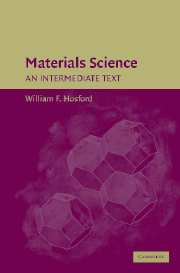Book contents
- Frontmatter
- Contents
- Preface
- 1 Microstructural Analysis
- 2 Symmetry
- 3 Miller–Bravais Indices for Hexagonal Crystals
- 4 Stereographic Projection
- 5 Crystal Defects
- 6 Phase Diagrams
- 7 Free Energy Basis for Phase Diagrams
- 8 Ordering of Solid Solutions
- 9 Diffusion
- 10 Freezing
- 11 Phase Transformations
- 12 Surfaces
- 13 Bonding
- 14 Sintering
- 15 Amorphous Materials
- 16 Liquid Crystals
- 17 Molecular Morphology
- 18 Magnetic Behavior of Materials
- 19 Porous and Novel Materials
- 20 Shape Memory and Superelasticity
- 21 Calculations
- Index
- References
20 - Shape Memory and Superelasticity
Published online by Cambridge University Press: 10 December 2009
- Frontmatter
- Contents
- Preface
- 1 Microstructural Analysis
- 2 Symmetry
- 3 Miller–Bravais Indices for Hexagonal Crystals
- 4 Stereographic Projection
- 5 Crystal Defects
- 6 Phase Diagrams
- 7 Free Energy Basis for Phase Diagrams
- 8 Ordering of Solid Solutions
- 9 Diffusion
- 10 Freezing
- 11 Phase Transformations
- 12 Surfaces
- 13 Bonding
- 14 Sintering
- 15 Amorphous Materials
- 16 Liquid Crystals
- 17 Molecular Morphology
- 18 Magnetic Behavior of Materials
- 19 Porous and Novel Materials
- 20 Shape Memory and Superelasticity
- 21 Calculations
- Index
- References
Summary
Shape memory alloys
With the shape memory effect, heating reverses prior plastic deformation. Alloys that exhibit this effect are ordered solid solutions that undergo a martensitic transformation on cooling. Shape memory effects were first observed in AuCd in 1932, but it was the discovery by Buehler et al. in of the effect in NiTi in 1962 that stimulated interest in shape memory. The alloy TiNi (49 to 51 atomic % Ni) has an ordered bcc structure at 200°C. On cooling it transforms to a monoclinic structure by a martensitic shear. The shear strain associated with this transformation is about 12%. There is more than one variant of the transformation. If only one variant of the martensite were formed, the strain in the neighboring untransformed lattice would be far too high to accommodate. Instead two mirror image variants form in such a way that there is no macroscopic strain. The macroscopic shape is the same as before the transformation. Figure 20.1 illustrates this. The boundaries between the two variants are highly mobile. The resulting structure can deform easily by movement of these boundaries. Figure 20.2 shows stress–strain curves above and below the Ms. Heating the deformed material above the Af temperature causes it to transform back to the ordered cubic structure by martensitic shear. The overall effect is that the deformation imposed on the low temperature martensitic form is reversed on heating.
Information
- Type
- Chapter
- Information
- Materials ScienceAn Intermediate Text, pp. 208 - 213Publisher: Cambridge University PressPrint publication year: 2006
